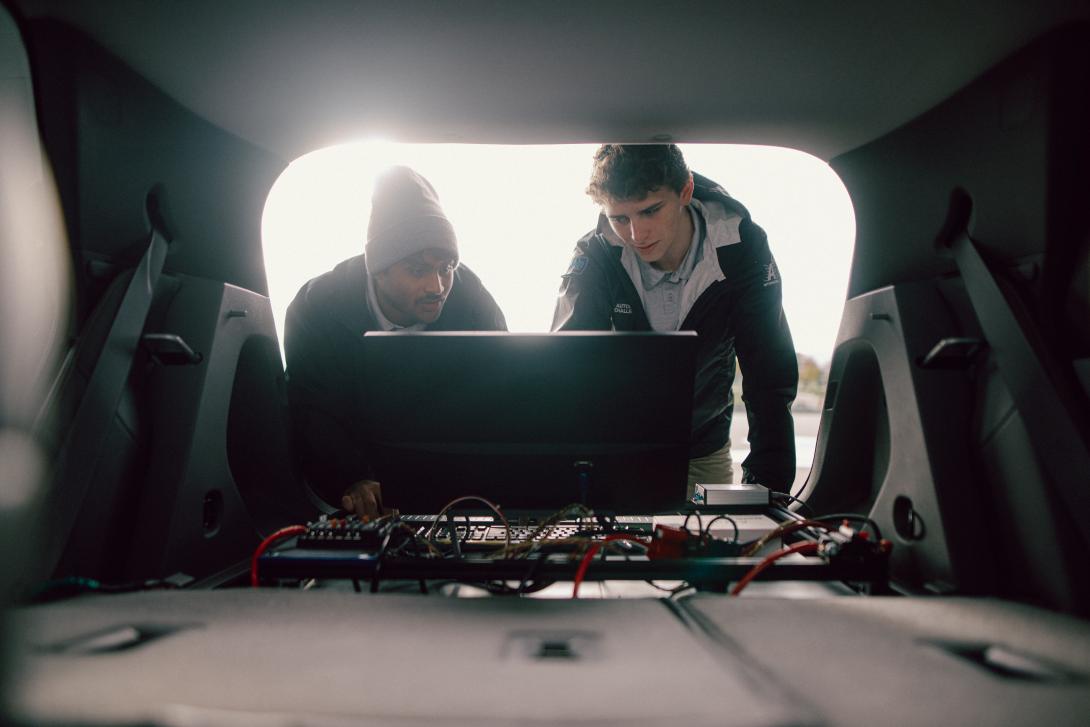New Energy Vehicles
Redefine transportation with advanced electric, hybrid, and fuel cell innovations.

Drive the evolution of energy-efficient transportation with Kettering’s cutting-edge programs in EV and fuel cell technology.
From electric vehicles (EVs) to hydrogen-powered fuel cells, Kettering University students don’t just study transportation—they shape its future.
- In 2023, global electric car registrations surged to 14 million, a 35% increase from the previous year, bringing the total to 40 million worldwide (IEA).
- In the U.S., 45% of potential buyers are considering an EV, and over half of skeptics plan to switch within five years (MarketWatch).
- Hydrogen fuel cell vehicles are on the rise, with the global market projected to grow from $12.57 billion in 2024 to $142.15 billion by 2032 (Fortune Business Insights).
Through partnerships with industry leaders, like Open Road and Flint’s hydrogen bus initiative, you’ll gain experience in EV optimization and hydrogen safety training. You won’t just learn theory—you’ll tackle real-world projects, work in state-of-the-art labs, and collaborate with faculty shaping the mobility revolution.
At Kettering, you’re not just keeping up with change—you’re driving it forward.
Kettering’s New Energy Vehicle Undergraduate Programs
Our bachelor’s degrees give you an edge in hybrid, electric, and fuel cell vehicle technology. Build the know-how to succeed through our industry-shaped coursework and real-world experience through our Co-op Program.
B.S. in Chemical Engineering
Under the guidance of Dr. Susan Farhat, Department Head, who specializes in high-pressure and temperature reaction engineering and separations, as well as supercritical fluid technology, you’ll engage in research focused on sustainable chemical processes and advanced materials for applications such as lightweight vehicle components and energy storage systems.
B.S. in Computer Science
Learn from Dr. Michael Farmer, Department Head, whose expertise includes artificial intelligence, software engineering, and computer vision. Engage in projects optimizing software for hybrid and electric vehicles, advancing safety, efficiency, and real-time decision-making through intelligent systems.
B.S. in Electrical Engineering
Collaborate with Dr. Mark Thompson, Department Head, who focuses on efficient production and utilization of electrical energy, including electric vehicle propulsion and power electronic converters. Participate in cutting-edge research on high-efficiency power systems and innovative charging solutions for EVs.
B.S. in Mechanical Engineering, Alternative Energy Concentration
Work alongside Dr. Javad Baqersad, an expert in composite materials, improving vehicle fuel efficiency through advanced material design. Contribute to research on optimizing thermal management in EVs and fuel cell vehicles to improve energy efficiency and extend system performance.
Kettering’s New Energy Vehicle Graduate Programs
Study with industry-leading faculty in our flexible on-campus and online programs. Each program combines rigorous technical training with practical applications in some of today's most high-paying fields.
M.S. in Electrical Engineering
Expand your research experience and knowledge to better prepare yourself for a leadership position. Our 10-course program covers digital systems design, power electronics for vehicle electrification, and energy storage systems.
M.E. in Electric Vehicles
Engage in project-based electric vehicle engineering courses focused on real-world applications. Tackle hands-on projects in vehicle and motor design, battery and fuel cell development, vector control of AC electric machines, and more.
Why Study New Energy Vehicles and Electric Vehicle Engineering at Kettering University?
Kettering’s faculty set industry standards across the new energy vehicle field. As a student, you’ll collaborate with them in labs on groundbreaking projects ranging from improving lithium-ion batteries to new motor designs. Your discoveries could even lead to patents and publication.
Kettering faculty areas of expertise include:
- Battery development and energy storage
- Battery management systems
- Battery materials (anode and cathode, separator, electrolyte, etc.)
- Fuel cells
- Power electronics (charging devices, electric motor design, etc.)
Kettering provides access to labs, research facilities, and equipment to all students — including first-year undergraduates. That way, you won’t just keep up with industry developments in hybrid and EVs; you’ll create them.
Specialized labs include:
Create a one-of-a-kind battery that powers an EV cart, or find ways to make a hydrogen fuel-cell vehicle more efficient. Our competition teams help you apply your classroom knowledge and put it to the test.
Careers in New Energy Vehicles
Electrical engineers are in demand as companies innovate in motor design and optimize charging infrastructure, as highlighted by reports from IEEE Spectrum. The shift to electric and automated vehicles also increases the demand for software developers, with Reuters noting the industry's transition is driving a need for expertise in cybersecurity and AI development.
Chemical Engineer
Design advanced materials for electric vehicle batteries that recharge faster and store more energy. Lead efforts to recycle EV batteries and reduce waste to make this industry more sustainable.
Computer Engineer
Improve the performance, efficiency, and safety of EVs, as well as develop software that controls battery management, vehicle control systems, and user interfaces.
Automotive Electronics Engineer
Create vital everyday systems for vehicles including antilock braking, safety systems, transmission control, and entertainment and navigation devices.
B.S. in Electrical Engineering
Software Developer
Create the computer applications that run hybrid, electric, and hydrogen fuel-cell vehicles. From battery management to autonomous driving systems, your coding skills will be critical as technology advances.
Electrical Engineer
Develop electric systems and parts inside new energy vehicles, including the motor to the electrical circuitry that controls the flow of electrical energy. You can also design and install charging stations.
Explore Kettering’s Areas of Study
Explore Kettering’s Areas of Study
The new energy vehicles area of study is one of five interdisciplinary fields at Kettering. Each grouping allows you to be an adaptable worker through courses, minors, and concentrations, making you nimble for your future career.

New Energy Vehicles News at Kettering
Next Steps
Design, engineer, and drive the next generation of new energy vehicles with hands-on bachelor’s and master’s degree programs at Kettering today.



